 Petzlover
Petzlover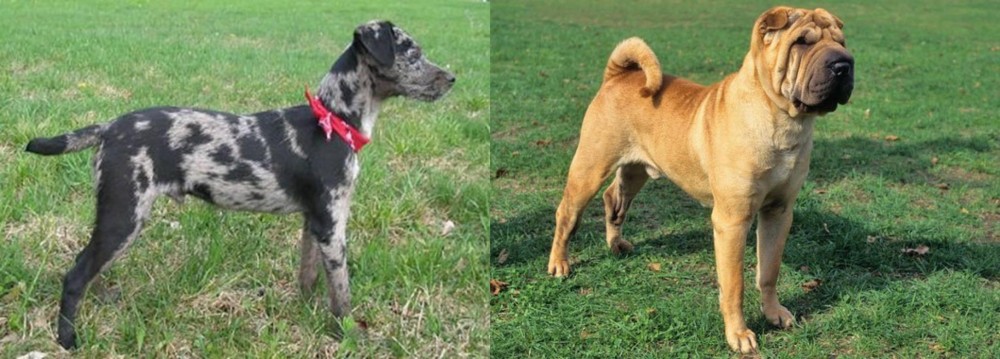 Atlas Terrier is originated from United States but Chinese Shar Pei is originated from China. Atlas Terrier may grow 28 cm / 11 inches shorter than Chinese Shar Pei. Atlas Terrier may weigh 19 kg / 41 pounds lesser than Chinese Shar Pei. Atlas Terrier may live 6 years more than Chinese Shar Pei. Both Atlas Terrier and Chinese Shar Pei has almost same litter size. Both Atlas Terrier and Chinese Shar Pei requires Moderate Maintenance.
Atlas Terrier is originated from United States but Chinese Shar Pei is originated from China. Atlas Terrier may grow 28 cm / 11 inches shorter than Chinese Shar Pei. Atlas Terrier may weigh 19 kg / 41 pounds lesser than Chinese Shar Pei. Atlas Terrier may live 6 years more than Chinese Shar Pei. Both Atlas Terrier and Chinese Shar Pei has almost same litter size. Both Atlas Terrier and Chinese Shar Pei requires Moderate Maintenance.
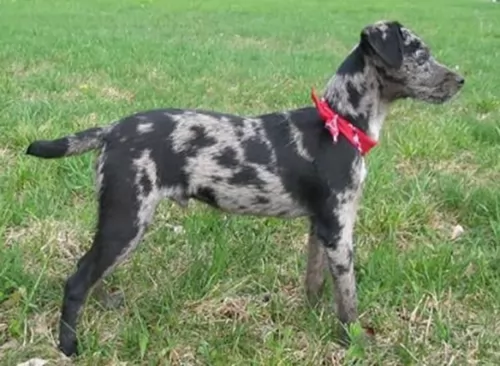 The Atlas Terrier is a rare dog. He was developed in the USA and is a blend of Jack Russell Terriers, Rat Terriers, Border Terriers and Patterdale Terriers. It was in 1990 that Lauren Wolfe developed a breed similar to the Jack Russell, but with a solid colour, and in fact she had two dogs that were solid red in colour. This was as a result of a cross between a Jack Russell Terrier and a Border Terrier.
The Atlas Terrier is a rare dog. He was developed in the USA and is a blend of Jack Russell Terriers, Rat Terriers, Border Terriers and Patterdale Terriers. It was in 1990 that Lauren Wolfe developed a breed similar to the Jack Russell, but with a solid colour, and in fact she had two dogs that were solid red in colour. This was as a result of a cross between a Jack Russell Terrier and a Border Terrier.
With the crossing of different terriers, the foundation for the Atlas Terrier was formed. Lauren Wolfe named the breed ‘Atlas Terrier’ because many terriers from various parts of the world were used to develop this specific breed. It was in 2001 that the Atlas Terrier Association was founded.
 The Chinese Shar-Pei is originally from Canton, China. The Shar-Pei has a blue-black tongue and many deep wrinkles. They have more wrinkles as a puppy than the adult dogs do. They are one of the rarest breeds in the world and are considered a basal breed – meaning their existence predates modern canines. Most canines are related to the gray wolf through genetic admixture. However, there are breeds like the Siberian Husky, the Greenland Dog, Finnish Spitz and the Shar Pei are all related to the Taymyr Wolk of North Asia through admixture. The Shar Pei is found throughout the centuries in Chinese artwork, especially found during the Han Dynasty, and are considered one of the most ancient of breeds on earth today. In this period, they were fighting dogs then became beloved pets. Today the Tibetans still use them as fighting dogs.
The Chinese Shar-Pei is originally from Canton, China. The Shar-Pei has a blue-black tongue and many deep wrinkles. They have more wrinkles as a puppy than the adult dogs do. They are one of the rarest breeds in the world and are considered a basal breed – meaning their existence predates modern canines. Most canines are related to the gray wolf through genetic admixture. However, there are breeds like the Siberian Husky, the Greenland Dog, Finnish Spitz and the Shar Pei are all related to the Taymyr Wolk of North Asia through admixture. The Shar Pei is found throughout the centuries in Chinese artwork, especially found during the Han Dynasty, and are considered one of the most ancient of breeds on earth today. In this period, they were fighting dogs then became beloved pets. Today the Tibetans still use them as fighting dogs.
Following the Communist Revolution, the Char Pei was almost extinct until Margo Law saved the breed. During this time, they smuggled around 200 dogs into the United States. All the dogs in the United States today come from those 200 dogs. They were accepted in 1992 into the AKC. The dogs served as trackers, hunters, ratters, guard dogs and herders.
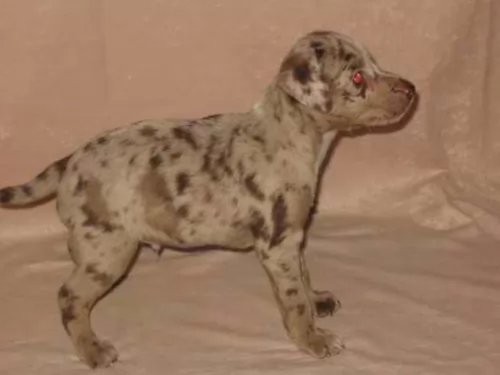 Atlas Terrier dogs are a small to medium sized dog but with a strong personality. With their two coat varieties – smooth and wire – and coming directly from the Jack Russell Terrier, this feisty dog suits those who want a low maintenance, fun breed who will join them on their walks or jogs. These dogs are brave and loyal and will double as a watch dog and family pet.The breed is accepted for registry and it is classified under the Terrier dog category.
Atlas Terrier dogs are a small to medium sized dog but with a strong personality. With their two coat varieties – smooth and wire – and coming directly from the Jack Russell Terrier, this feisty dog suits those who want a low maintenance, fun breed who will join them on their walks or jogs. These dogs are brave and loyal and will double as a watch dog and family pet.The breed is accepted for registry and it is classified under the Terrier dog category.
There are 3 sizes of Atlas Terrier – toy, miniature, and standard. The toy variety is 23 to 28 cm tall at the shoulder and weighs 2.7 to 5.4 kg. All three varieties are the same except for height and weight.
The coat of this dog is thick and may come in a variety of colours such as brindle or merle. The Atlas Terrier is also found in solid colours and sometimes you will find that they have white markings on the face, feet or chest. Most times the tail of the Atlas Terrier is docked, but if not, the tail curls over the back. The ears of the Atlas Terrier are V-shaped and they fold forward.
 The Chines Sar Pei has what if known as a Horse-coat which is prickly, harsh, and rough to the touch on one direction and rough to touch on the other. Western Shar Peis can be Horse, Bearcoat and Brush. The Brush is longer and smoother while the Bear coat is rare and in-between the two. The Bearcoat is not accepted by the AKC while the other two types of coats are.
The Chines Sar Pei has what if known as a Horse-coat which is prickly, harsh, and rough to the touch on one direction and rough to touch on the other. Western Shar Peis can be Horse, Bearcoat and Brush. The Brush is longer and smoother while the Bear coat is rare and in-between the two. The Bearcoat is not accepted by the AKC while the other two types of coats are.
The Shar Pei should have a hippo shaped head, a black-purple tongue, black mouth, deep set almond shaped dark eyes, small ears and red coats. His profile is square, and his muzzle is full and wide. Most Shar Peis only have facial and neck wrinkles left as adults.
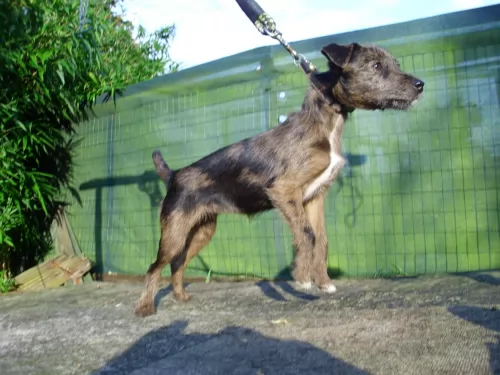 Atlas Terriers most certainly have a bit of the Jack Russell in them and these dogs are social, outgoing, mischievous and affectionate. They’re just like your regular naughty child and having one of them in your home will mean energy and lots of fun and games.
Atlas Terriers most certainly have a bit of the Jack Russell in them and these dogs are social, outgoing, mischievous and affectionate. They’re just like your regular naughty child and having one of them in your home will mean energy and lots of fun and games.
This is a highly social breed and he won’t like to be left alone every day. Just like a human child, he will need to be stimulated to ward off boredom and to prevent him from becoming destructive.
The Atlas Terrier just loves games and if you’re ready for a game, he will be more than ready to take part. He is intelligent and will therefore responds well to training and socialization. When properly socialized, Atlas Terriers get along well with children, and because they’re not an aggressive breed, if they’re properly trained and socialized they will get along with other pets too. Atlas Terriers make excellent pets, but he is a strong willed dog and will require an owner who is firm, but fair.
 The Shar Pei must be socialized early to other people, children and animals if he is to be friendly with them. He is loyal to his people and instinctively wary of strangers. He will be completed devoted to his people, but he is reserved and independent. They can be aggressive and territorial if not socialized. They are stubborn, loving and loyal. They are dominant, brave and playful. They are great watch dogs. Keep them busy because they tend to think a lot independently and if they don’t have a job they may create one.
The Shar Pei must be socialized early to other people, children and animals if he is to be friendly with them. He is loyal to his people and instinctively wary of strangers. He will be completed devoted to his people, but he is reserved and independent. They can be aggressive and territorial if not socialized. They are stubborn, loving and loyal. They are dominant, brave and playful. They are great watch dogs. Keep them busy because they tend to think a lot independently and if they don’t have a job they may create one.
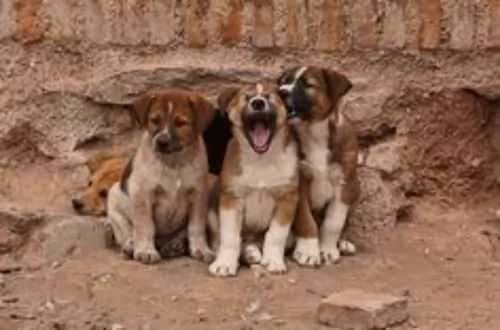 The selective breeding program of Atlas Terriers has meant that this is a robust, spunky breed free of any major health concerns. While they are a low maintenance breed with longevity on their side, you still have to be a responsible pet owner and see that your Atlas Terrier puppy gets all those must have injections.
The selective breeding program of Atlas Terriers has meant that this is a robust, spunky breed free of any major health concerns. While they are a low maintenance breed with longevity on their side, you still have to be a responsible pet owner and see that your Atlas Terrier puppy gets all those must have injections.
Tiny puppies are susceptible to infectious diseases and will have to be vaccinated against them from 8 weeks on and then also get an annual booster. The diseases to be vaccinated against include hepatitis, distemper, parvovirus, coronavirus, eptospirosis and parainfluenza. Vaccinations must be kept up to date and it is mandatory for your puppy to be vaccinated against rabies.
 Because of the rushed and inexperienced breeding programs in the United States due to the popularity of the breed, there are many health issues in the North American version of the Shar Pei. Their life expectancy is generally under ten years. They are prone to:
Because of the rushed and inexperienced breeding programs in the United States due to the popularity of the breed, there are many health issues in the North American version of the Shar Pei. Their life expectancy is generally under ten years. They are prone to:
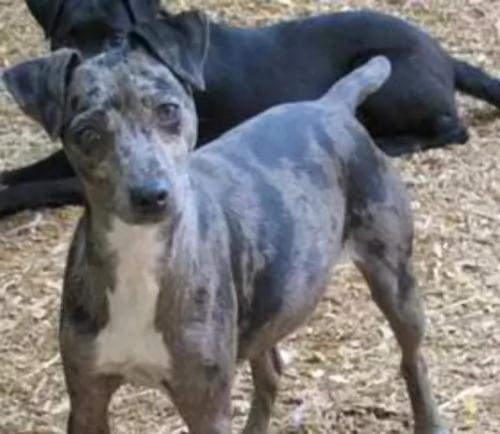 As a medium shedder, the Atlas Terrier will require some grooming. Grooming is easy and a brush twice a week with a rubber-bristled brush will remove those loose hairs and give his coat a sheen.
As a medium shedder, the Atlas Terrier will require some grooming. Grooming is easy and a brush twice a week with a rubber-bristled brush will remove those loose hairs and give his coat a sheen.
Always make sure you’re feeding your tiny puppy the right quantities of a food type. Always feed your puppy food which is appropriate to his age. Your 8 week old puppy will require 4 meals a day. A highly active breed such as the Atlas Terrier will require more protein for energy.
Speak to your veterinarian about the perfect diet for your puppy and about wet- or dry foods. There is the choice of feeding your puppy commercial dog food or your own home-prepared meals, but then you want to be sure that your puppy is getting the right balance of minerals and vitamins.
Once your Atlas Terrier is about a year of age, he can go onto one meal a day or a lighter meal in the morning and the evening. Remember to ensure that there is always clean, cool water available for your puppy.
 Feed a good quality dry dog food but do not overfeed. You should feed twice a day about one cup per six pounds for puppies. Adults should have two cups a day.
Feed a good quality dry dog food but do not overfeed. You should feed twice a day about one cup per six pounds for puppies. Adults should have two cups a day.
• Familial Shar Pei Fever – congenital and serious. This produces fevers that can last from 24 hours to three days. Swelling around the ankles is due to fluid retention.
• Entropion eye issues – eyelashes curl in and inflame the eye. Can cause blindness if not treated. Requires surgery.
Both as a puppy and an adult this is a pretty active dog. He needs at the very least to be walked every day or have a back yard to play in. They are sensitive to heat so bring them in when its really hot and don’t walk them in the heat. They love to play, are athletic and competitive. Try agility, tracking, rally and obedience trials.